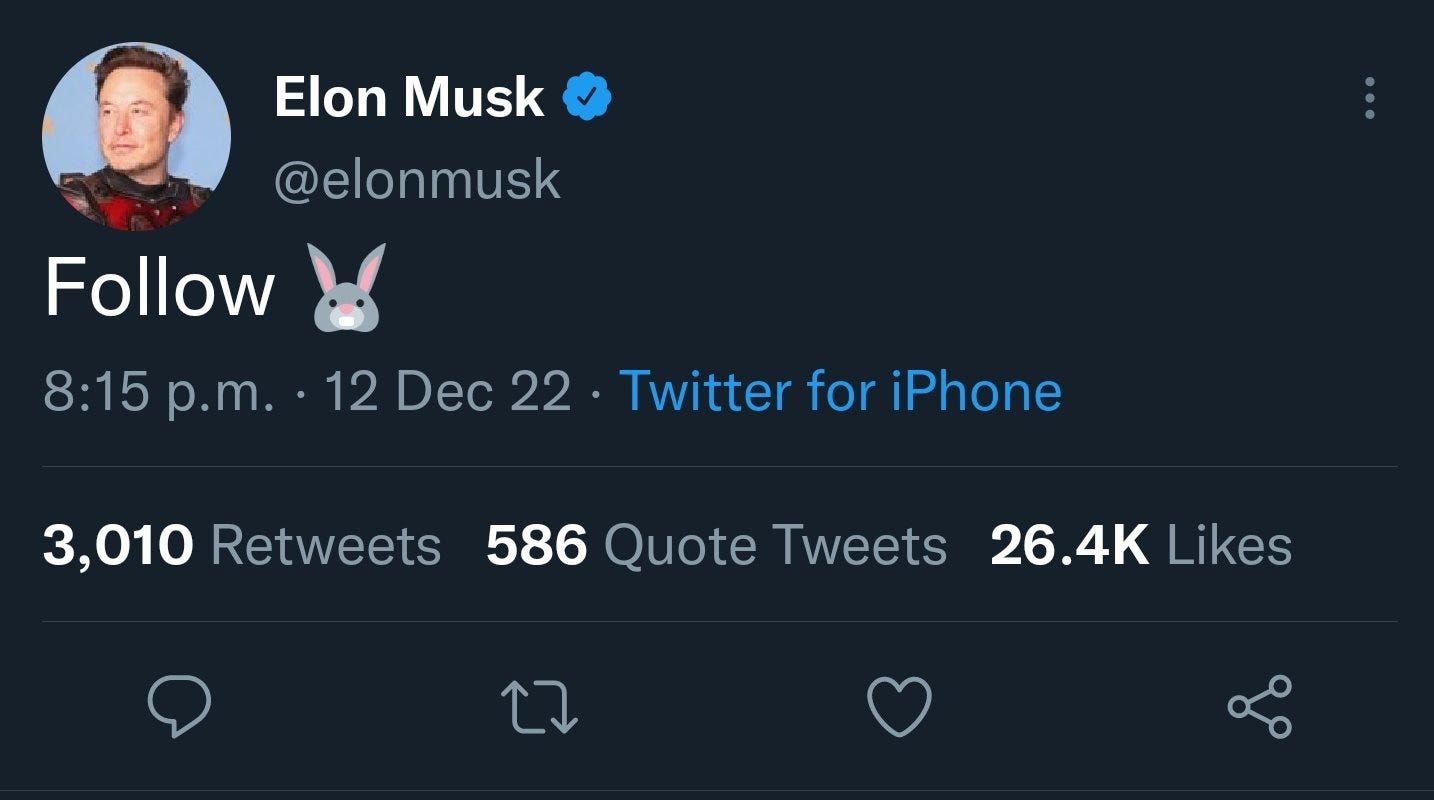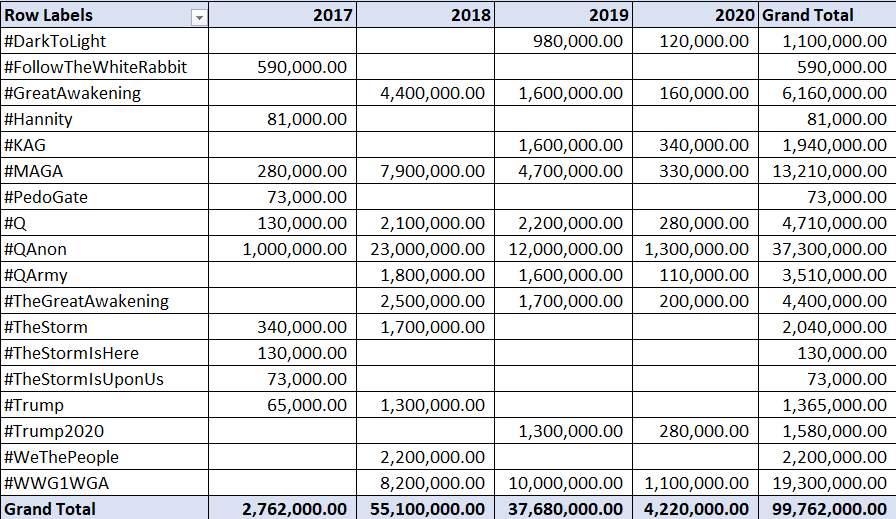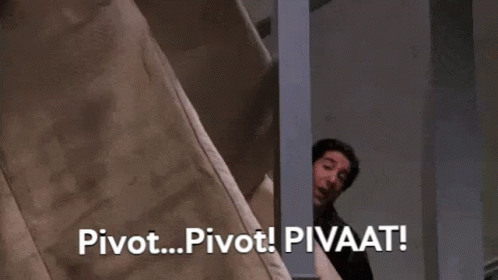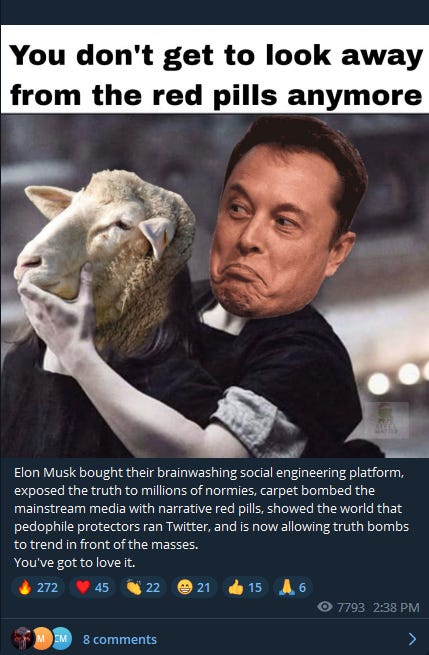On December 12, 2022, Elon Musk tweeted out “follow” and a rabbit emoji. There are ongoing discussions by some about if this means that he is intentionally winking at the QAnon community, or if he is pilled on QAnon, or if this is intentional trolling/shitposting or if this is a reference to the Matrix movies or to Alice in Wonderland. The problem with all of these is that observers are trying to ascribe their own interpretations and biases upon what they think this means or what Musk’s intentions are by his tweet.
My reaction and interest to this tweet is not what Musk intended to say or what point he was trying to make. Rather I am interested in what his tweet means to QAnon adherents and how they will interpret this. We have no evidence to indicate that his intention was to wink at the QAnon movement, actually we don’t know what his intentions are and I would take with a grain of salt anyone who says they know what his intentions are. To that end, I would like to examine how this reference is being interpreted by QAnon adherents and influencers presently, and what Follow the White Rabbit has meant to the movement in the past.
How I study QAnon
I want to briefly touch upon how I have studied the QAnon movement over the past 5 years. My goal in studying QAnon was to make sense of the lived experiences and the meanings ascribed by individuals through the examination of their everyday realities and the interpretation of these lived experiences (Pink et al., 2016). One of the methods I used in my multidisciplinary doctoral research was digital ethnography, which is a research method that involves studying people and communities online in order to understand their behaviors, beliefs, and interactions. This method can be used to study a wide range of groups, from small, tight-knit communities to larger, more diffuse networks. Digital ethnographers use a variety of tools and methods, including (non-)participant observation, interviews, and content analysis, to gather data from online sources such as social media, blogs, and forums. For my own research I have immersed myself within QAnon communities and ecosystems through non-participant observations and content analysis.
My goal in using digital ethnography is to provide a detailed and nuanced picture of the social and cultural dynamics of online QAnon communities. As Boellstorff, Nardi, Pearce, and Taylor (2013) highlight, the digital ethnographer takes on the role of processing the collection of texts and graphics made available on digital mediums, and engages in making sense of the meanings portrayed through texts or graphics. This is what I have done not only for my research for QAnon, but other violent extremist actors by observing the behaviour, interactions and activities of participants in their own digital ecosystems, as well as engaging with and processing the primary material the community has created.
My desire as a researcher is to represent as faithfully as possible the perspective of an insider within these communities and ecosystems and separate, as much as possible, my own biases in my analysis. Therefore when I first saw the Tweet Musk put out, my analysis and interpretation was from that of an insider with QAnon, not what this can means to everyone and anyone.
The History of Follow the White Rabbit in QAnon
Why would this Tweet be interpreted by QAnon adherents as Musk sending them a message? Meaning making is key to QAnon belief as the conspiracy theories that make up QAnon act to explain what is happening in the world and offer and easy answer. “Q” and QAnon adherents have created an interpretive frame for their ideologies by interpreting what powerful individuals have done and said. The most prominent of those figures being Donald Trump, whose every move, statement, tweet, they way he dressed, the time he did things, etc. were all ways in which, to “Q” and QAnon adherents, they believed Donald Trump was communicating with them. It is these forms of covert communications they turned to when deciphering the information the Trump and White Hats were giving to “Q” so that those who have been awakened can have access to the information the Deep State is trying to keep away from them. This is the most basic function of participation in QAnon, taking benign elements and turning them into “top secret intelligence”.
One of the early keywords and markers that the QAnon community used on Twitter, Reddit and 4chan among themselves, even before “Q” ever used it in a Qdrop, was Follow the White Rabbit. Now there are several pop culture references from which this slogan can be pulled form: the Matrix movies, Alice in Wonderland, Jefferson Airplane songs, etc. QAnon as an ideology is influenced by the distrust of the everyday reality, as everything mainstream being false—with their reality being “true”— therefore QAnon as an ideology turns to the fictitious and popular culture to find hidden meanings they can unlock via their secret insider knowledge. Therefore, when “Q” signed off their early drops with Alice in Wonderland (drops 78, 80, 82-84, 86, 144, 435) following the white rabbit hinted at following “Q”. Later in 2018, when “Q” began to reference The Matrix movie, the follow the white rabbit took on a different interpretive frame and was more aligned with the concept of the Great Awakening.
If we look at the top 10 hashtags annually, in my sample collection of Twitter data related to QAnon between October 2017 and February 2020, (which I have rounded for the purpose of my exercise at the time) we can see that #FollowTheWhiteRabbit only made it into the top 10 in 2017.
This is reflective of the Qdrops produced in 2017 during QAnon’s infancy, and how meaning making took place within the neophyte QAnon community. We need to remember that early QAnon was extremely chaotic and the early “Q” was not even calling themselves “Q” or had any perception of a future movement that QAnon would be; rather this was part of a wider anon genre that existed on the chans.
Why is all of this important? Well many of the QAnon influencers active today, were also active and aware of the early QAnon lore, and can thus make a link between their early experiences within the movement. Therefore, when Musk sent this tweet out, OG QAnon influencers saw this as a way of linking the current reality of the QAnon movement to its origins.
The Existential Crisis of QAnon
Unlike what some have said, QAnon is not dead; however, it is very much a victim of an identity crisis since Donald Trump, the prophetic figure of their ideology, lost the election and since “Q”, the movements oracle, stopped posting (though “Q” started posting again, most influencers and adherents are not buying it and have called out Jim Watkins on his BS). As Twitter user @2022_Karma correctly highlighted, some QAnon influencers, as a reaction to the post by Musk, pivoted and started making links to Qdrops that would indicate that the prophetic statement “The Storm is Upon US” was never suppose to come from Trump, but Musk.
This is not the first time that QAnon influencers and adherents have attempted to find a new prophetic figure, rather this has been a continued trend since January 2021. However, since Musk purchased Twitter, QAnon influencers have integrated Musk into their ideology, as a white hat working with “Q” et al. to fight against the Deep State. For QAnon adherents, Twitter is not only another social media platform, rather it plays a sacred role for the movement. Twitter is the platform of choice for QAnon, as it is the public square where political activity takes place, and “Q” dictated time and time again that Twitter is where the digital war will take place and that QAnon adherents need to create “meme ammo” based on Qdrops and decodes to raise awareness about the Great Awakening. Twitter is where QAnon adherents are no longer simple consumers of information and passive observers in the fight against the Deep State, rather Twitter is where adherents are told they are to fight as digital soldiers and that they are key to winning the information war. Being banned from Twitter following January 6, 2021 was a blow to QAnon adherents who felt they had lost the kinetic and digital war all at once. However, the reinstatement of banned accounts and changes in moderation on Twitter have given QAnon adherents hope that they will not only be able to return to the digital battlefield but that the tide in the digital war will turn in their favour.
QAnon was a movement that had lost hope and was actively and regularly looking for anything they can latch on to help them cope, while influencers told them to hold the line, that there is a bigger plan they were not aware of yet, that this is part of the strategy and that they need to be steadfast, etc. For QAnon influencers and adherents Musk not only helped them cope over the past two months, but now gives them hope that they were right all along. This is what is important, it is not what Musk meant, it is not about what it mean to you or me as outsides of the movement and ecosystems, it about what this means or how it is interpreted by QAnon influencers and adherents and how this will impact the behaviour of the movement. It's important to examine meaning making from the perspective from an insider. Here are how influencers have been reacting to the Tweet.
It is hard to tell if Musk will ever become a prophetic figure for the movement long term, but in the short term influencers and adherents are returning to a tried and true method turn to a person of position of power, whom they believe is sending them coded methods, from which they must used their secret knowledge to find the “top secret information” that is being sent their ways.
As with Trump, they are turning to what Musk is posting on Twitter, whether it is the Twitter Files or his own tweets, he is filling an important role within a violent extremist movement that was in crisis, giving them hope to carry on what they have been doing.













